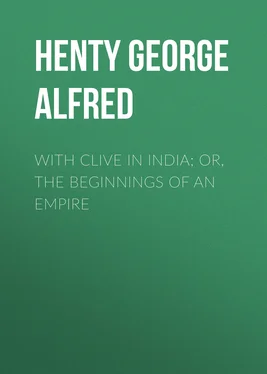George Henty - With Clive in India; Or, The Beginnings of an Empire
Здесь есть возможность читать онлайн «George Henty - With Clive in India; Or, The Beginnings of an Empire» — ознакомительный отрывок электронной книги совершенно бесплатно, а после прочтения отрывка купить полную версию. В некоторых случаях можно слушать аудио, скачать через торрент в формате fb2 и присутствует краткое содержание. Жанр: foreign_children, foreign_antique, foreign_prose, prose_military, на английском языке. Описание произведения, (предисловие) а так же отзывы посетителей доступны на портале библиотеки ЛибКат.
- Название:With Clive in India; Or, The Beginnings of an Empire
- Автор:
- Жанр:
- Год:неизвестен
- ISBN:нет данных
- Рейтинг книги:5 / 5. Голосов: 1
-
Избранное:Добавить в избранное
- Отзывы:
-
Ваша оценка:
- 100
- 1
- 2
- 3
- 4
- 5
With Clive in India; Or, The Beginnings of an Empire: краткое содержание, описание и аннотация
Предлагаем к чтению аннотацию, описание, краткое содержание или предисловие (зависит от того, что написал сам автор книги «With Clive in India; Or, The Beginnings of an Empire»). Если вы не нашли необходимую информацию о книге — напишите в комментариях, мы постараемся отыскать её.
With Clive in India; Or, The Beginnings of an Empire — читать онлайн ознакомительный отрывок
Ниже представлен текст книги, разбитый по страницам. Система сохранения места последней прочитанной страницы, позволяет с удобством читать онлайн бесплатно книгу «With Clive in India; Or, The Beginnings of an Empire», без необходимости каждый раз заново искать на чём Вы остановились. Поставьте закладку, и сможете в любой момент перейти на страницу, на которой закончили чтение.
Интервал:
Закладка:
"Chunda Sahib and Muzaffar Jung put their heads together, and agreed to act in concert. Muzaffar, of course, desired the subadarship of the Deccan, to which he had been appointed by the court of Delhi. Chunda Sahib wanted the nawabship of the Carnatic, and advised his ally to abandon his intention of asking for Mahratta aid, and to ally himself with the French. A correspondence ensued with Dupleix, who, seeing the immense advantage it would be to him to gain what would virtually be the position of patron and protector of the Subadar of the Deccan, and the Nawab of the Carnatic, at once agreed to join them.
"Muzaffar raised thirty thousand men, and Chunda Sahib six thousand–it is always easy, in India, to raise an army; with a certain amount of money, and lavish promises–marched down and joined a French force of four hundred strong, commanded by D'Auteuil.
"The nawab advanced against them, but was utterly defeated at Ambur, the French doing pretty well the whole of the work. The nawab was killed, and one of his sons, Maphuz Khan, taken prisoner. The other, Muhammud Ali, bolted at the beginning of the fight. Arcot, the capital of the Carnatic, surrendered next day.
"Muzaffar Jung proclaimed himself Subadar of the Deccan, and appointed Chunda Sahib Nawab of the Carnatic. Muzaffar Jung conferred upon Dupleix the sovereignty of eighty-one villages adjoining the French territory. Muzaffar, after paying a visit to Pondicherry, remained in the camp with his army, twenty miles distant from that place. Chunda Sahib remained, as the guest of Dupleix, at Pondicherry.
"On the receipt of the news of the battle of Ambur, Mr. Floyer, who is governor at Fort Saint David, sent at once to Chunda Sahib to acknowledge him as nawab; which, in the opinion of everyone here, was a very foolish step. Muhammud Ali had fled to Trichinopoli, and sent word to Mr. Floyer that he could hold the place, and even reconquer the Carnatic, if the English would assist him. I know that Admiral Boscawen, who was with the fleet at Fort Saint David, urged Mr. Floyer to do so, as it was clear that Chunda Sahib would be a mere tool in the hands of the French.
"When Chunda Sahib delayed week after week at Pondicherry, Mr. Floyer began to hesitate, but he could not make up his mind, and Admiral Boscawen, who had received orders to return home, could no longer act in contravention to them, and was obliged to sail.
"The instant the fleet had left, and we remained virtually defenceless, Chunda Sahib, supplied with troops and money by Dupleix, marched out from Pondicherry and joined Muzaffar Jung, with the avowed intention of marching upon Trichinopoli. Had he done this at once, he must have taken the place, and it was a question of weeks and days only of our being turned altogether out of Southern India. Nothing, indeed, could have saved us.
"Muzaffar Jung and Chunda Sahib, however, disregarding the plan which Dupleix had marked out for them, resolved, before marching on Trichinopoli, to conquer Tanjore, which is the richest city in Southern India. The rajah had, only a few weeks before, made peace with us; and he now sent messengers to Nazir Jung, Muzaffar's rival in the Deccan, and to the English, imploring their assistance. Both parties resolved at once to grant it, for alone both must have been overwhelmed by the alliance between the two Indian princes and the French; and their only hope of a successful resistance to this combination was in saving Trichinopoli.
"The march of these allies upon Tanjore opened the road to Trichinopoli; and Captain Cope, with a hundred and twenty men, were at once despatched to reinforce Muhammud Ali's garrison. Of this little force, he sent off twenty men to the aid of the Rajah of Tanjore, and these, under cover of the night, passed through the lines of the besiegers and into the city, which was strongly fortified and able to stand a long siege.
"The English at once entered into a treaty with Nazir Jung, promising him six hundred English troops; to assist him in maintaining his sovereignty of the Deccan, and in aiding to place Muhammud Ali in the nawabship of the Carnatic.
"Tanjore held out bravely. For some weeks the rajah had thrown dust in the eyes of Chunda Sahib, by pretending to negotiate. Then, when the allies attacked, he defended the city for fifty-two days, at the end of which one of the gates of the town had been captured, and the city was virtually at the mercy of the besiegers. He again delayed them by entering into negotiations for surrender. In vain Dupleix continued to urge Chunda Sahib to act energetically, and to enter Tanjore.
"Chunda Sahib, however, although he has a good head for planning, is irresolute in action. His troops were discontented at the want of pay. The French contingent also was demoralized, from the same cause. The troops feared to engage in a desperate struggle, in the streets of a town abounding with palaces, each of which was virtually a fortress; especially as it was known that Nazir Jung was marching, with all speed, to fall upon their rear. So at last the siege was broken up, and the army fell back upon Pondicherry.
"Meanwhile Cope's detachment of a hundred men, with six thousand native horsemen, escorted Muhammud Ali to join Nazir Jung at Valdaur, fifteen miles from Pondicherry. Lawrence was busy at work at Fort Saint David, organizing a force to go to his aid. Dupleix saw that it was necessary to aid his allies energetically. The army, on its return from the siege of Tanjore, was reorganized; the French contingent increased to two thousand men; and a supply of money furnished, from his private means.
"The army set out to attack Nazir Jung and his ally at Valdaur. When the battle began, however, the French contingent mutinied and refused to fight; and the natives, panic stricken by the desertion of their allies, fell back on Pondicherry. Chunda Sahib accompanied his men. Muzaffar Jung surrendered to his uncle, the usurper.
"In three or four days the discipline of the French army was restored, and on the 13th of April it attacked and defeated a detachment of Nazir Jung's army; and a few days later captured the strong temple of Tiruvadi, sixteen miles from Fort Saint David.
"Some months passed before the French were completely prepared; but on September the first, D'Auteuil, who commanded the French, and Chunda Sahib attacked the army of the native princes, twenty thousand strong, and defeated it utterly, the French not losing a single man. Muhammud Ali, with only two attendants, fled to Arcot, and the victory rendered Chunda Sahib virtual master of the Carnatic.
"Muzaffar Jung, after his surrender to his uncle, had been loaded with chains, and remained a prisoner in the camp; where, however, he managed to win over several of the leaders of his uncle's army. Gingee was stormed by a small French force, and the French officer there entered into a correspondence with the conspirators, and it was arranged that, when the French army attacked Nazir Jung, these should declare against him.
"On the 15th December the French commander, with eight hundred Europeans, three thousand Sepoys, and ten guns, marched against Nazir Jung, whose army of twenty-five thousand men opposed him. These, however, he defeated easily. While the battle was going on, the conspirators murdered Nazir Jung, released Muzaffar Jung, and saluted him as subadar. His escape was a fortunate one, for his uncle had ordered him to be executed that very day.
"Muzaffar Jung proceeded to Pondicherry, where he was received with great honors. He nominated Dupleix Nawab of the Carnatic and neighbouring countries, with Chunda Sahib as his deputy, conferred the highest dignities upon him, and granted the French possession of all the lands and forts they had conquered. He arranged with Dupleix a plan for common action, and agreed that a body of French troops should remain permanently at his capital."
Читать дальшеИнтервал:
Закладка:
Похожие книги на «With Clive in India; Or, The Beginnings of an Empire»
Представляем Вашему вниманию похожие книги на «With Clive in India; Or, The Beginnings of an Empire» списком для выбора. Мы отобрали схожую по названию и смыслу литературу в надежде предоставить читателям больше вариантов отыскать новые, интересные, ещё непрочитанные произведения.
Обсуждение, отзывы о книге «With Clive in India; Or, The Beginnings of an Empire» и просто собственные мнения читателей. Оставьте ваши комментарии, напишите, что Вы думаете о произведении, его смысле или главных героях. Укажите что конкретно понравилось, а что нет, и почему Вы так считаете.












